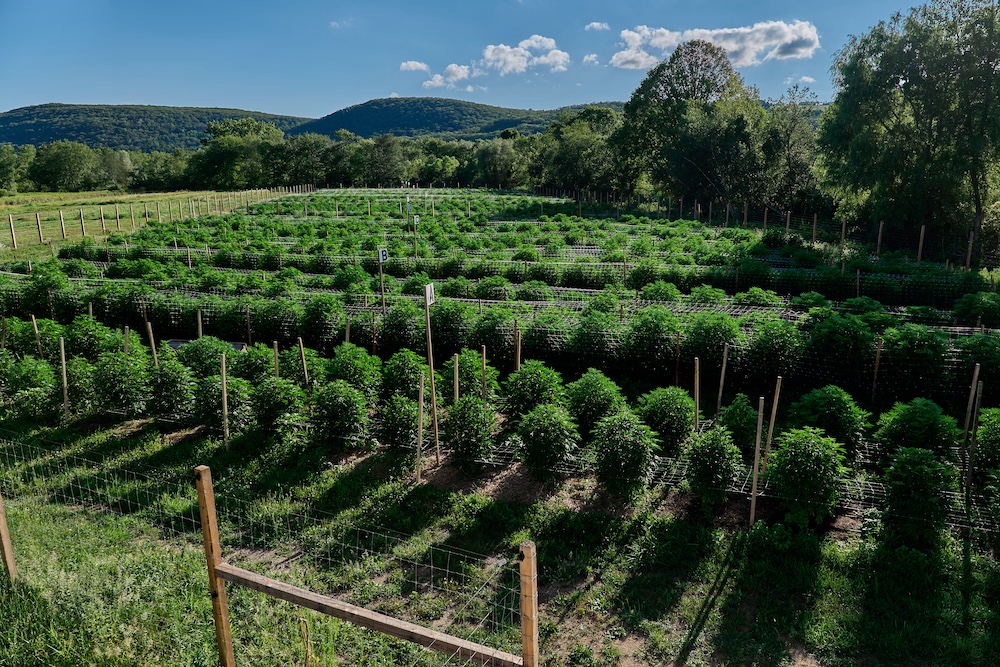
High Vibe, High Ground: Cannabis, Hudson Valley Style
Sunlit fields, soulful growers, and counters alive with local connection.
New York’s green rush was never destined to be a straightaway. It’s been more like one of the Valley’s backroads—glorious views, surprise detours, the occasional washout. Federal illegality still snarls banking; lawsuits have paused and unpaused the on-ramp; farmers have weathered seasons of abundance with too few storefronts to catch the crop. And yet, the market has learned to breathe. Dispensaries are blooming in real neighborhoods. Growers are leaning into terroir and transparency. What once lived in the margins is finding its manners—and its voice—here in the Hudson Valley.
This place has its own temperament—winds that carry generosity, soil that holds its ground, a community that insists on knowing the story behind whatever it brings to the table. In the late afternoon, the hills themselves seem to exhale. Leaves chatter, ladybugs fuss like jewel-toned stagehands, compost rises warm as bread dough. Nothing here is merely grown; it is raised—like children, like ideas, like the barn you’ve been meaning to finish for years. And now, as cannabis moves from head-shop hush to farm-stand pride, the Hudson Valley is giving the plant what it always wanted: sun, soil, and story—and the consumer what they’ve long deserved: clarity, consistency, and care.
Here’s a look at the farms and dispensaries living this ethos—where cannabis evolves from commodity to culture, rooted in terroir, transparency, and the kind of neighborly exchange that, in true Hudson Valley fashion, feels as instinctive and pleasurable as chatting with your favorite farmer at the Saturday market.
Hudson Cannabis | Hudson, NY | @hudsoncannabis
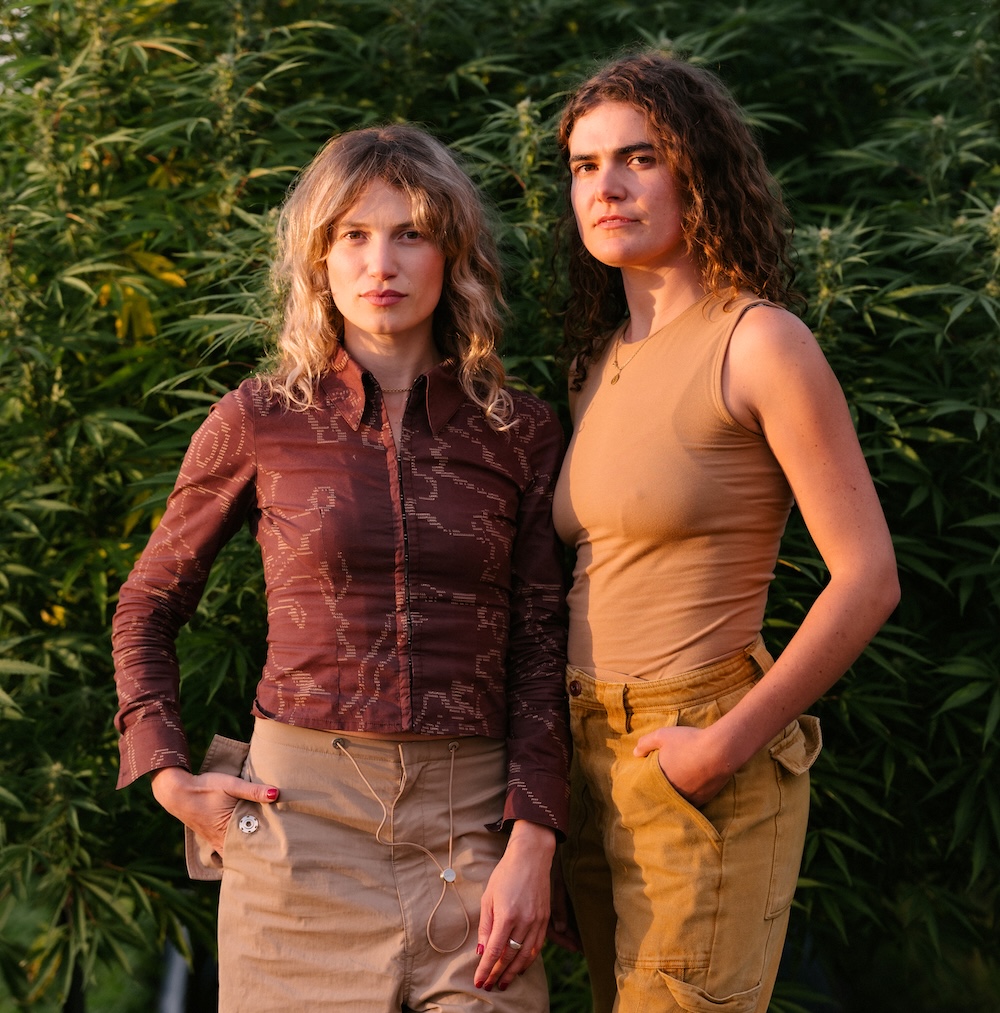
Photo of Melany and Freya Dobson by Adam Whyte
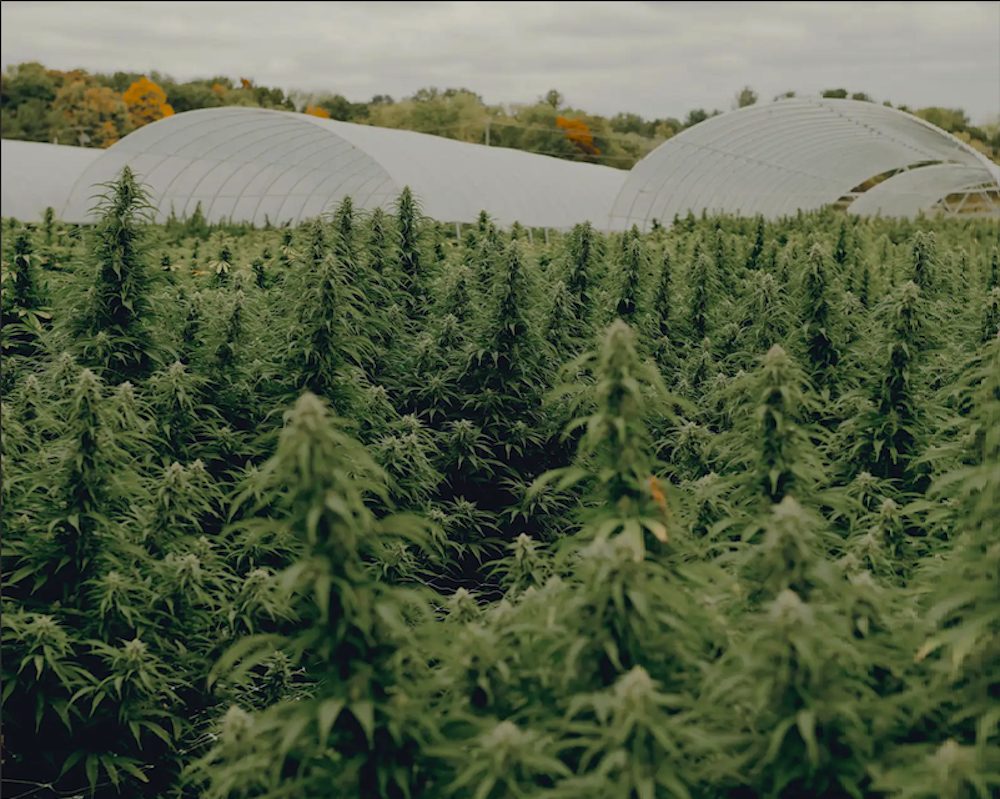
Photo by Todd Milder
Where Provenance Meets Terroir
For Freya Dobson, co-founder of Hudson Cannabis, the plant was always braided into daily life—“hanging in closets, in mason jars in the kitchen,” she recalls—an intimacy shadowed by taboo. Her father trained under organic pioneer Alan Chadwick at UC Santa Cruz, then caravaned east with donkeys to homestead in Hillsdale, raising vegetables (and, illicitly, cannabis) to keep the farm afloat. What once carried shame has become Freya’s life’s work, recast with transparency and provenance.
Founded with her brother and sister in 2017 (transitioning to adult-use in 2022), Hudson Cannabis now operates on a 500-acre farm, featuring a 3-acre cannabis plot and roughly 46,000 square feet of licensed canopy. Freya steers daily operations and still makes deliveries herself to New York City dispensaries—terroir literally hand-carried from farm to city.
This is cannabis that tastes like it belongs here. The farm sits in the Valley’s natural airway, where steady breezes dry dew before mildew can take hold. A decade of building “living soil” underpins every harvest: compost folded back into the earth, clover and buckwheat cover crops, perennial grasses, and companion planting that lures pollinators while warning off pests. Corn borers from neighboring fields are held in check by parasitic wasps; neem and colloidal silver step in for molds; compost teas, tailored to each stage of the plant’s growth, are fed through irrigation lines like a seasonal tonic. “We’re working with nature, not against it,” Freya says. “When you grow in living soil, you can actually taste the Hudson Valley.”
From certain high points, you can see the Catskill silhouettes and almost feel the Hudson River’s old trade winds. During the hemp era, Hudson Cannabis even shipped CBD downriver on the sail-powered schooner Apollonia—a gesture equal parts distribution and love letter to pre-diesel commerce.
Hudson’s name now lives as much in its processes as in its jars. The farm produces and distributes for aligned partners: 1906, whose effect-based edibles are manufactured on-site with Hudson extract; Lowell Herb Co., whose distinctive pre-rolls are made by the Hudson team; and Alchemy Pure, whose sun-grown flower rides their network. As the statewide market turned flower into a race-to-the-bottom commodity, Hudson doubled down on nuance. “Our hash was the number one SKU in the state,” Freya notes. Dry-sifted and low-heat pressed, it preserves the plant’s glittering trichomes, delivering an expression that isn’t louder, just finer.
Since the hemp days, Hudson has welcomed people onto the land. Today, tours are invite-only, designed for budtenders, owners, and investors: soil talks, field walks, lunch under the sky, and gift bags to carry the lesson home. Sister farms deepen the weave: Churchtown Dairy (biodynamic, regenerative) and Stone House Grain (feed for animals, grains for brewers and bakers). Together, they form a local food web in which cannabis has its rightful place.
Freya envisions a future of appellations of origin—cannabis treated like wine, coffee, or tomatoes—where consumers graduate from chasing THC percentages to savoring the entourage effect and gentler modes of consumption. “It’s not about getting obliterated,” she says. “It can be your glass of wine or your morning coffee—woven into daily life in beautiful ways.”
And in an industry that still tilts corporate and male, she doesn’t miss the irony. “The plant is female, yet the business around it is dominated by men,” she says. “We’re fighting to keep cannabis in women’s hands, in farmers’ hands—close to the ground where it belongs.”
Alchemy Pure | Millerton, NY | @alchemy_pure
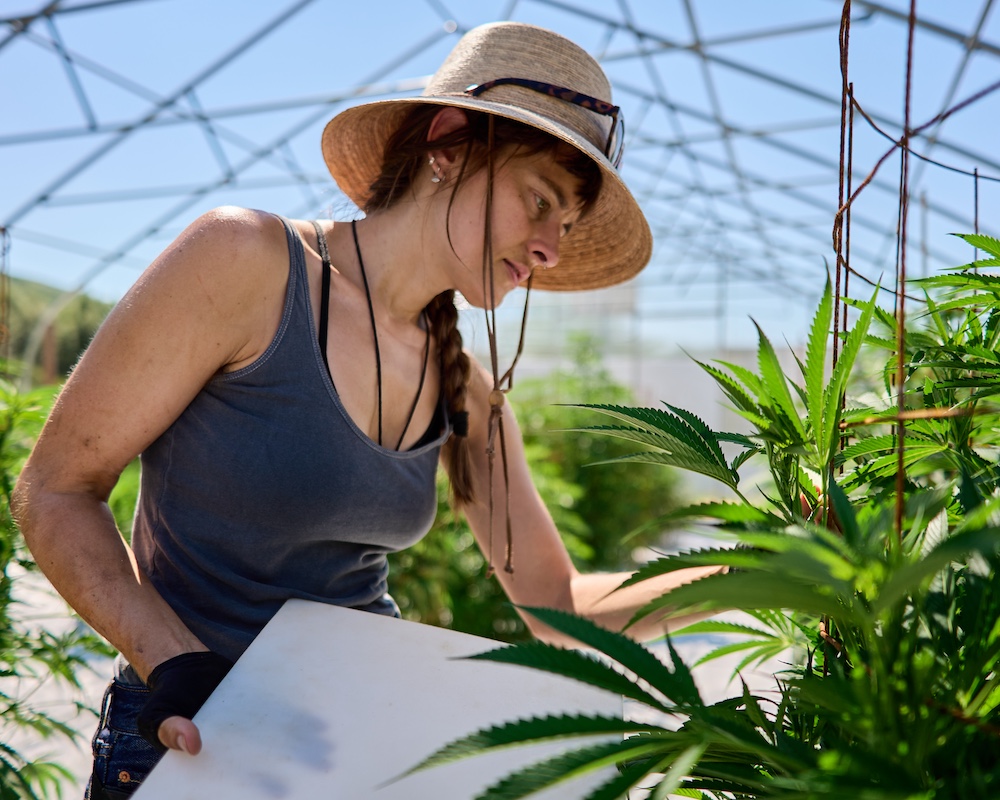
Photo by Walter Hergt

Photo by Walter Hergt
Sun, Soil, and the Joy of a “Creature”
Chris Regan didn’t so much find cannabis as grow into it. A painter turned farmer, he spent twenty-five years raising lettuces on Sky Farm—his salad greens appearing on the plates of chefs and farm stands across the Hudson Valley. However, after a quarter of a century, he felt restless. “I loved it,” he says. “I loved the product, I loved working with chefs. But after 25 years, I was getting a little bored.” When hemp licensing came along, he added the crop; when adult-use cannabis became possible, he pivoted completely.
Today, with his partner Jerry Peele, Chris tends seven acres on the foothills of the Berkshires, about 800 feet above sea level. It’s glacial till soil—lean on organics but mineral-rich and perfectly drained—fortified each year with ~300 tons of composted manure from Jerry’s livestock. Fields rotate annually so the ground can breathe. “Cannabis loves compost, loves sun,” Chris says. “It’s a vigorous plant—give it that and it becomes a small tree in a season.”
The farm hums with its own ecosystem. Outdoors, aphids arrive and so do the ladybugs—“my plants are covered in them right now,” Chris grins. Inside the greenhouses, lacewings and parasitic wasps are introduced to keep the balance. Voles are handled by a Carolina dog—“sort of a dingo”—who patrols the rows with comic zeal. “She’s the best farm dog,” Chris laughs. Pest management here is a choreography of predators, not poisons.
Processing occurs at a second site in Pine Plains, where trimming, packaging, and pre-rolls are all done from their own fields. “We’re small-big-small,” Chris says. “Not tiny, but everything we sell is what we grow. No buy-ins, no shortcuts.” Solventless hash and rosin are next on the horizon, crafted with nothing but ice, pressure, and patience. Aphrodite’s pre-rolls are made with Alchemy’s flower—a partnership born of Chris’s conviction that collaboration keeps the Valley’s ecosystem thriving.
The ties run deep: Chris once farmed side by side with Freya Dobson’s father (of Hudson Cannabis) in their salad days, a lineage that bridges food and flower. That history threads forward into distribution too—Hudson Cannabis now helps move Alchemy’s crop statewide. Locally, Dome Dispensary remains one of their biggest champions, moving more of their flower than anyone else.
Ask what surprises him about cannabis, and Chris doesn’t hesitate. “It’s the virility,” he says. “I call it a creature—it has a complex interface with the grower and the world.” That vitality mirrors the Hudson Valley itself: resilient, stubborn, exuberant. With each season, he bets the region’s palate will follow its instincts—just as people pay more for salad greens from a trusted small farm, they’ll value cannabis raised with care, terroir, and nerve.
Hudson Valley Jane | Beacon, NY | @hudsonvalleyjane
![]()
The Grower’s Dispensary
If Hudson Cannabis is the grand cru and Alchemy Pure the old-world vintage, Hudson Valley Jane is the Saturday microbrew: small-batch, handcrafted, joyfully transparent. Their Beacon shop carries the ease of a Martha’s Vineyard farm stand—sunlit, welcoming, lined with jars that invite lingering. On one wall, a live feed from their Ancram grow collapses the space between soil and storefront. “See your plants, know your grow,” says co-founder Ben Weiner, delighted by the intimacy of letting customers witness the crop in real time.
Behind that screen hums a 13,000-square-foot greenhouse-meets-indoor facility, built in a single year by Ben—contractor, legacy grower—and his partner, Stacey Shurgin, who layered farming grit on top of a nonstop New York real estate business—sleep, she insists, is optional. Fitted with light-dep curtains, radiant heat, and prepped for geothermal cooling, the hybrid design grants control without sterility, yielding fresh harvests every two to three weeks. “We’re a micro-license,” Ben explains. “Our lane is the microbrew version—handcrafted, finer quality.”
That spirit threads through everything they touch. Gummies are made from real fruit purées, tweaked until the texture lands just right. Stalks return as holiday wreaths; leaf fiber heads to a local mill to be pulped into paper. Valley Jane grew from Stacey’s answer to the product she wished existed—reliable, dose-marked gummies friends could trust, designed to take the edge off and make dosing simple. Alongside it, Boujee Ben emerged as the connoisseur counterpart: premium, sun-grown strains from a legacy cultivator with a chef’s mentality—complex profiles, full-spectrum effect.
Their quiet credo is clean farming: professional soils, elemental nutrients, organic oils for pest management, and tight controls that keep microbials low. “Organic on the label doesn’t automatically mean better,” Ben notes. “We chased purity and control.” Inside the dispensary, education is folded seamlessly into the experience. Guests are nudged away from chasing THC percentages and toward the symphony of terpenes—how an 18% flower can deliver a sweeter, more dimensional high than a 30% rocket. The circle always closes with the land itself. “We’re farmers first,” Ben says. “Not a big corporation—we grow it, we make it, we hand it to you.”
From Fields to Counters — How Hudson Valley Dispensaries Lend Local Flavor
If farms and growers root cannabis in sun and soil, dispensaries carry its story the last mile—translating cultivation into culture, field into ritual. In the Hudson Valley, that means shelves lined with local harvests, owners on a first-name basis with growers, and a community that values the relationship just as much as the product itself.
Domes Dispensary | Kingston, NY | @domesdispensary
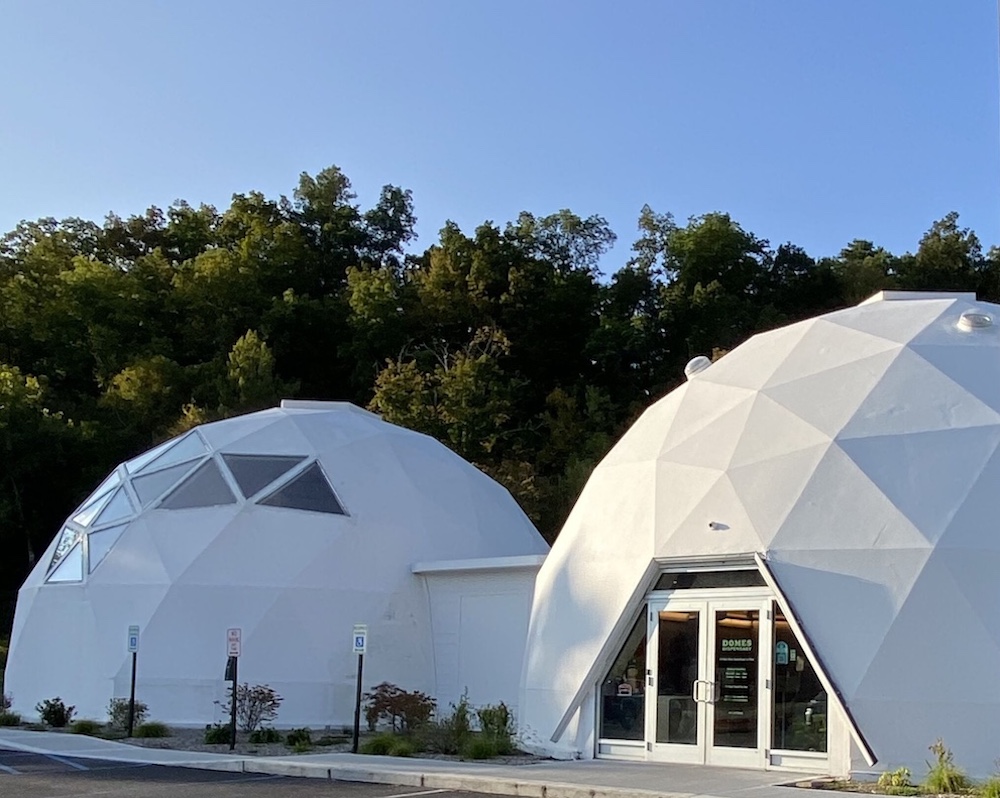
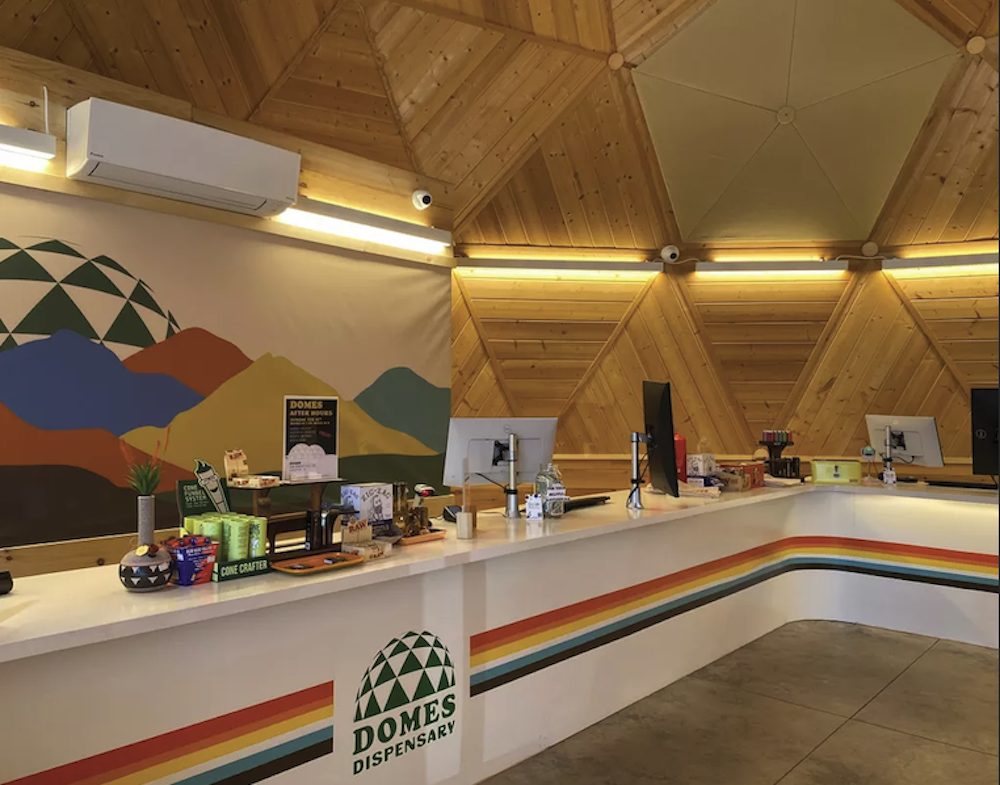
The Landmark
Seen from the road, Domes is a geometric beacon, all clean lines and white arcs. Cross the threshold, and the geometry melts into glow: amber wood, chalet charm, an improbable lantern tucked into the Hudson Valley. Step inside and it feels less like retail and more like a landmark—part Buckminster Fuller utopia, part Storm King sculpture, part cherished Epcot memory improbably nestled in the hills.
Owners Jennifer Dundas and her husband, David Tivnan, reimagined the space with as much care as the architecture itself. Jennifer, who once founded her own ice cream brand, brings the same entrepreneurial spirit and sense of delight to Domes, while David’s background in large-scale building and electrical work ensures every curve and finish feels both considered and human-scaled. Together, they’ve created a shop that is striking and deeply welcoming: a circular hand-built cash wrap anchors the room, curved shelving bends with the dome’s geometry, and lighting is designed to flatter rather than overwhelm. “We were careful not to look like an Apple Store,” Jennifer says. “We wanted something stylish but not intimidating.” The result is chalet-meets-teepee—earthy, elegant, and unmistakably Hudson Valley.
Here, connection matters more than the counter. Staff act like sommeliers, listening first, then tailoring guidance to the moment. Whether you want a breezy in-and-out or a guided tour through notes of pine, citrus, and pepper, the pace is yours to set.
On paper, Domes runs a pharmacy-level operation with more than a thousand SKUs, but the curation leans deeply local—brands like Hurley Grown and Alchemy Pure highlighted as neighbors on a map. Community isn’t an accessory here; it’s the pulse. Third Thursdays transform the dome into a listening room, its acoustics uncanny enough to surprise musicians themselves. On holiday weekends, growers set up outside like a farmers’ market, weaving commerce with conversation. Although they can’t sell directly by law, these events give cannabis farmers a stage to share their stories, offer education, and connect with the public—turning transaction into dialogue and information into delight.
At Domes, that spirit spills outside the shop too, with events like Backyard@Domes—picnic tables and food trucks, live music drifting through the mountain air, and farmers sharing their stories. It’s cannabis woven into the community, Kingston-style. Design pulls you in; people keep you there. That’s the Domes difference: elegant, earthy, and perfectly at home in the Hudson Valley.
HERbal Woodstock | Woodstock, NY | @herbalwoodstock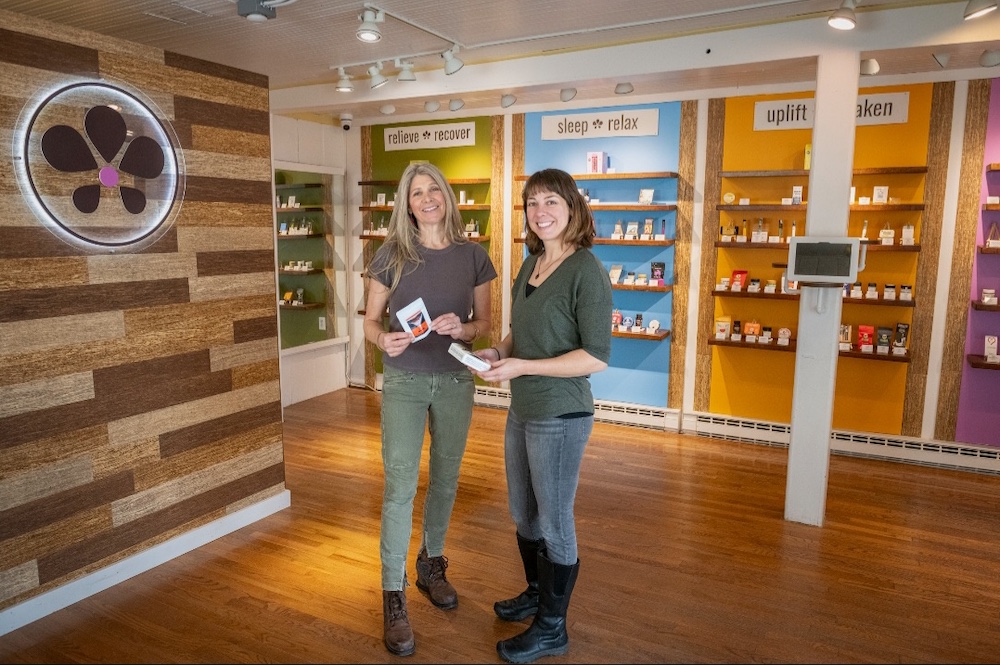
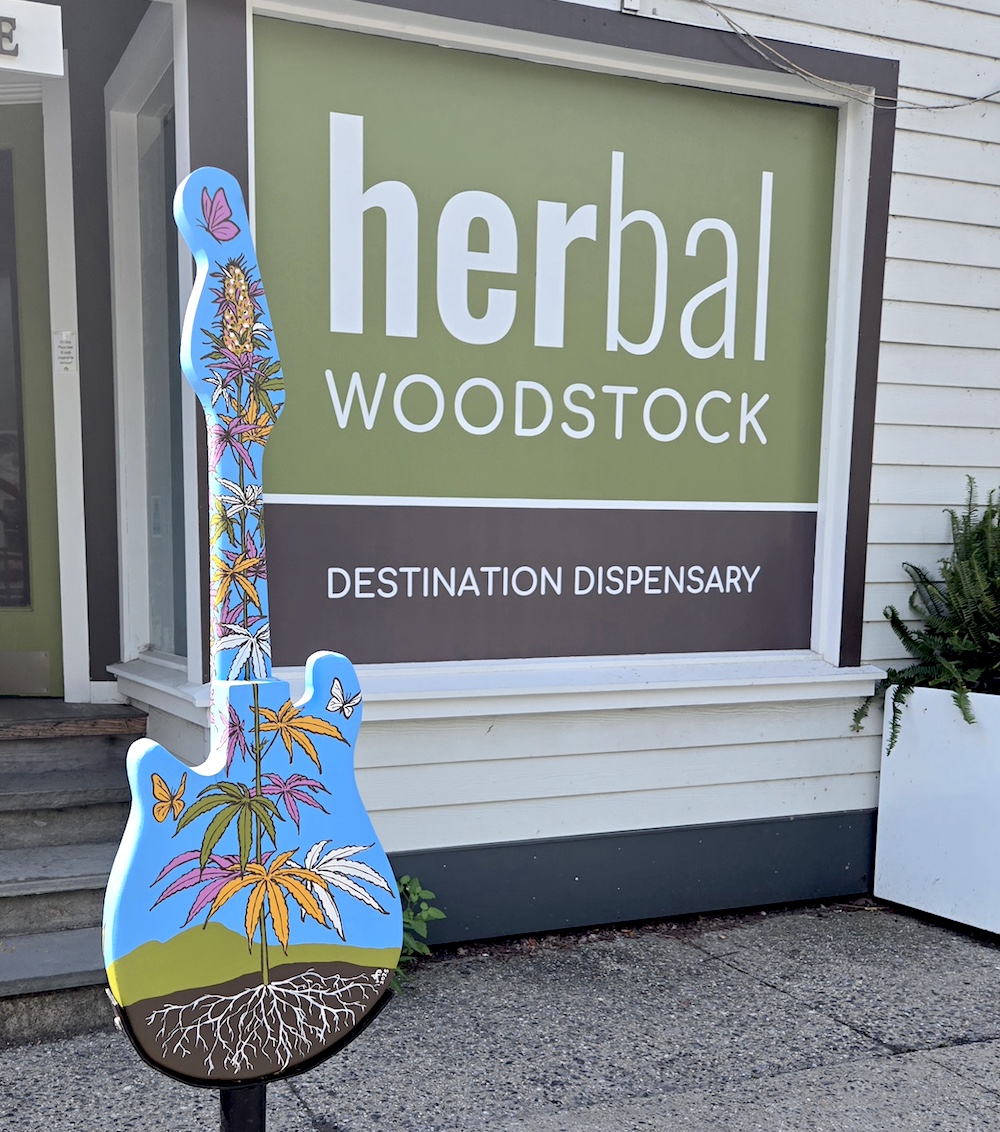
The Hearth
HERbal Woodstock is the mother-rooted hearth: feminine by name and intention, community-owned, and lit with care for the plant. Pronounced with an emphasis on HER, the dispensary opened its doors on Tinker Street this past April, the creation of partners Melissa Gibson and Courtney Beaupre, who cut their teeth in Hudson Valley hemp retail before stepping into the adult-use market. From its first days, HERbal has felt less like a storefront and more like a gathering place—a space where ritual, knowledge, and neighborliness converge.
Few towns could cradle such a vision the way Woodstock does. With its deep cultural history, countercultural legacy, and long-standing intimacy with the natural world, Woodstock seems almost destined to have a dispensary like this—one that channels the town’s artistic, open-hearted spirit into a modern expression of plant medicine. Here, plant-friendly locals and curious visitors mingle easily, and the staff’s deep knowledge and personal warmth make every interaction feel like an invitation rather than a transaction.
Curation here is deliberate. “We prioritize smaller, independent growers and aim to build lasting relationships with those aligned with offering customer-driven, high-quality goods,” Melissa says. Packaging aesthetics and sustainability tip the scale, but provenance and purpose always weigh more. HERbal’s shelves tell the story: Skyrose, Back Home Cannabis, Green Spectrums, Supernaturals, Hurley Grown and Hudson Cannabis—each a neighbor, each a note in the Valley’s evolving chorus.
With deep roots in the hemp era, Melissa and Courtney entered adult-use with relationships already forged. “We were able to call upon those connections to shape our inventory from the start,” Melissa notes. It’s a model of regional resilience: local farms, processors, and makers sustaining one another. “The Hudson Valley has a rich history and legacy of agriculture, with many multi-generational farms now embracing cannabis,” Melissa reflects. “It makes sense that some of the best flower in New York grows here.” From their perch in the Catskill Forest Preserve, HERbal leans into that heritage—treasuring the soil, stewarding the plant, and offering it back to the community as both medicine and ritual.
Root 9 | Wappingers Falls, NY | @root9dispensary
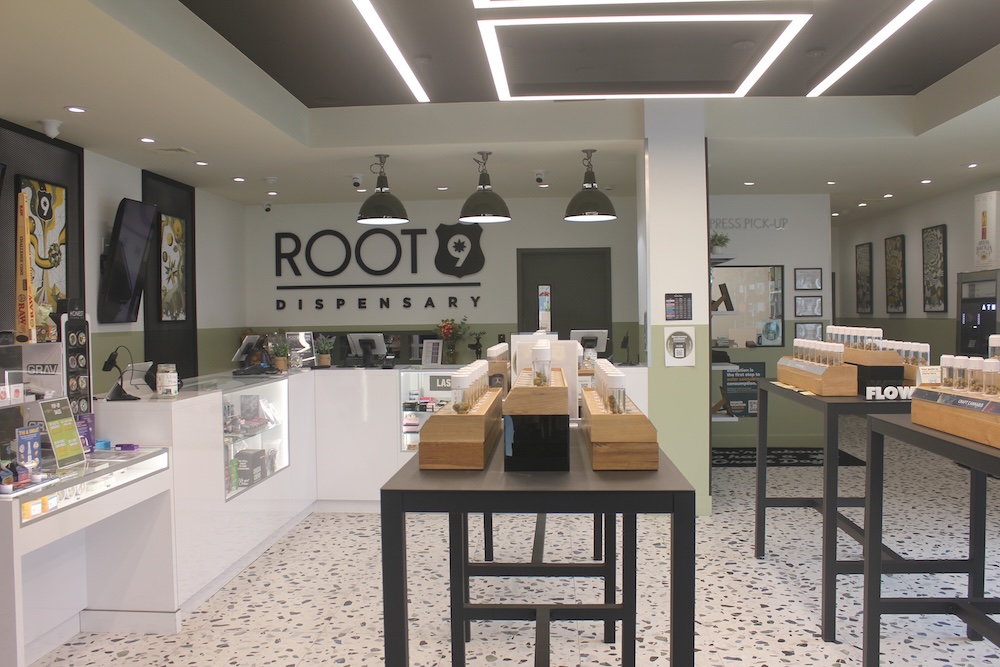
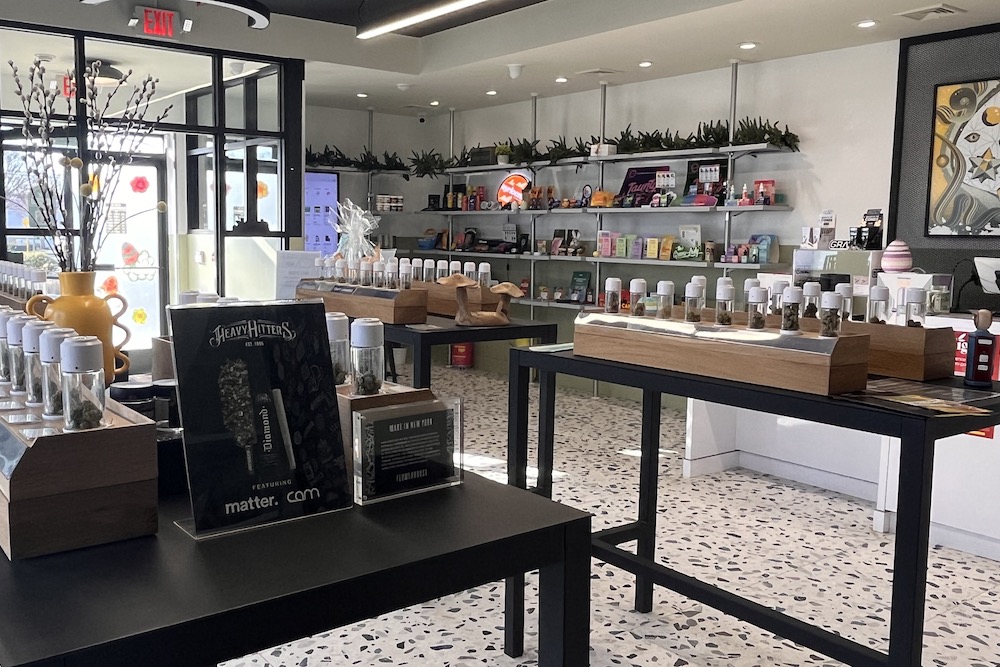
The Gathering Place
Root 9 feels less like a dispensary than a front porch for Wappingers Falls—welcoming, grounded, and threaded into the rhythms of everyday Hudson Valley life. Licensed owner Frank Bocci opened the shop with his family after years of farming hemp upstate, transforming a onetime Planet Wings into a bright, approachable hub where cannabis can be understood, enjoyed, and trusted.
Everything on the shelves is New York-grown, a state rule that doubles as a curatorial compass. Flower, concentrates, edibles, tinctures, topicals: the lineup rotates often, guided by customer feedback and in-house tasting. Budtenders try products so they can speak from experience; they’re guides, not clerks, matching people to what fits the shape of their day. The clientele skews older—40-plus on average—and the top asks are practical and human: sleep and pain. A best-in-class sleep gummy anchors the case, while pre-rolls and small “dime bag” sizes make it easy to sample without overspending. Regulars drop in every week (and often more), greeted by name; first-timers get an unhurried walkthrough that feels more like hospitality than retail.
And then there’s the sheer creativity of what’s emerging. Root 9 keeps a close eye on an ever-expanding universe of delivery systems and infusions—curating the best rather than stocking everything. Canatella (a cannabis Nutella with less sugar), a new pistachio version on the horizon, THC-infused olive oil and coconut oil, chapstick with THC, ice pops, and ice cream cones with chocolate centers all hint at where the market is headed. Gummy ropes, rings, syrups, honey, tea — the possibilities keep evolving. “It’s limitless,” the team notes, “every time we turn around, there’s something new, and we’re watching so our customers can try the best of what’s next.”
Community lives beyond the counter. Cars & Coffee Sundays offered monthly pull in classic car fans, vendors, donuts, and neighborly chatter before the doors even open. And this fall, the shop marks a milestone with a one-year anniversary party on November 1—a celebration pitched in the same spirit as the store itself: local, warm, and unabashedly welcoming.
In Wappingers Falls, Root 9 proves cannabis can be retail and refuge at once—family-owned, rooted in local soil, and offered with porch-light ease.
The Shape of What’s Next
If the past of cannabis was clandestine, its future in the Hudson Valley is conversational. Farm tours with soil under your nails and long-table lunches. Shops that feel like chic pantries rather than neon shrines. Budtenders fluent in notes of pine, citrus, and pepper instead of just percentages. Cocktails and cannabis socials. Cannabis growing classes at local farms. Regulation will lurch and settle, big players will squeeze margins, but small farms will keep answering with story, stewardship, and flavor.
Because here, stubborn grace has always been the region’s secret crop. The wind moves down off the hills; the ladybugs get back to work; the fields exhale their bread-dough warmth. And the plant—raised, not merely grown—keeps telling its story, rooting itself deeper into the Hudson Valley’s soil, until its future feels less like invention than recognition: this was always where it belonged.
+ + +
This article is intended for informational and educational purposes only and does not constitute legal or medical advice. Readers are responsible for understanding and complying with local laws regarding cannabis use and possession. Always consume responsibly. INSIDE+OUT Upstatee NY does not promote or endorse the illegal use of cannabis.
Please consume responsibly. This product may cause impairment and may be habit-forming. For use only by adults 21 years of age and older. Keep out of reach of children and pets. In the event of accidental ingestion or overdose, contact the Poison Control Center hotline at 1-800-222-1222 or call 911.
+ + +
EXPLORE THE DIRECTORY for anything you’re looking for, whether you’re living, visiting, or working in the Hudson Valley!
Write a Comment
You must be logged in to post a comment.





